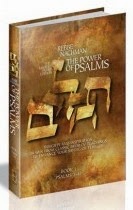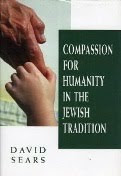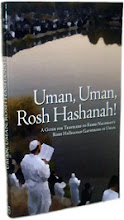From the Breslov Pirkey Avot (Breslov
Research Institute), Chapter 6, Mishnah 2
אָמַר רַבִּי יְהוֹשֻׁעַ בֶּן לֵוִי, בְּכָל יוֹם וָיוֹם בַּת קוֹל יוֹצֵאת
מֵהַר חוֹרֵב וּמַכְרֶזֶת וְאוֹמֶרֶת אוֹי לָהֶם לַבְּרִיּוֹת מֵעֶלְבּוֹנָהּ שֶׁל
תּוֹרָה שֶׁכָּל מִי שֶׁאֵינוֹ עוֹסֵק בַּתּוֹרָה נִקְרָא נָזוּף, שֶׁנֶּאֱמַר
נֶזֶם זָהָב בְּאַף חֲזִיר אִשָּׁה יָפָה וְסָרַת טָעַם.
וְאוֹמֵר וְהַלֻּחֹת מַעֲשֵׂה אֱלֹהִים הֵמָּה וְהַמִּכְתָּב מִכְתַּב
אֱלֹהִים הוּא חָרוּת עַל הַלֻּחֹת, אַל תִּקְרָא חָרוּת אֶלָּא חֵרוּת, שֶׁאֵין
לְךָ בֶּן חוֹרִין אֶלָּא מִי שֶׁעוֹסֵק בְּתַלְמוּד תּוֹרָה.
וְכָל מִי שֶׁעוֹסֵק בְּתַלְמוּד תּוֹרָה הֲרֵי זֶה מִתְעַלֶּה, שֶׁנֶּאֱמַר
וּמִמַּתָּנָה נַחֲלִיאֵל וּמִנַּחֲלִיאֵל בָּמוֹת:
Rabbi Yehoshua ben Levi said, “Every
day a Heavenly voice goes out from Mount Horeb proclaiming and saying, ‘Woe to
humanity for disdaining the Torah!’ For anyone who does not occupy himself with
the Torah is called ‘rebuked,’ as it is written, ‘As a golden ring in a swine’s
snout is a beautiful woman without discretion’ (Proverbs 1:22).
“And it is written, ‘The Tablets are
the work of God, and the writing is the writing of God engraved on the Tablets’
(Exodus 32:16). Do not read charut (‘engraved’), but cherut (‘freedom’), for no
one is free except he who engages in Torah study.
“Anyone who occupies himself with Torah study
will be spiritually elevated, as it is written, 'From Matanah to Nachliel, and
from Nachliel to Bamot’” (Numbers 21:19).
Digest
of Commentaries:
Every
day a Heavenly voice goes out from Mount Horeb.
Mount Horeb (Har Chorev) is another name for Mount Sinai. When the Jewish nation does not
occupy itself with the Torah, Mount Sinai becomes ChaReV (“desolate"
or "ruined”). This may explain why the term ChoReV is used here,
since this teaching speaks of the neglect of the Torah (Midrash Shmuel).
For anyone who
does not occupy himself with the Torah is called "rebuked," as it is
written, "As a golden ring in a swine's snout ...
.” This
applies to a scholar who lacks intellectual discretion and restraint. One who
uses the intellect for inferior purposes is compared to a pig that burrows in a
dung heap and in filth (Tiferet Yisrael). Why Pirkey Avot cites
this verse as a proof-text for such a scholar being called “rebuked” is
somewhat unclear; however, the letters of the word NaZuF (“rebuked”) can
be found in the Hebrew words of the verse, Nezem Zahav be’aF (“a gold
ring in a snout”) (Midrash Shmuel, quoting Rabbi Ephraim).
Do
not read charut ("engraved"), but cherut ("‘freedom"), for
no one is free” from domination by the evil inclination and the
passions of the heart, except he who engages in Torah study
which, we learned in the previous teaching (6:1), "distances him from
sin and draws him near to virtue … [and] magnifies and elevates him above all
things."
Anyone who occupies himself with Torah
study will be spiritually elevated, as it is written, "From Matanah to Nachliel, and from Nachliel to Bamot.” These are names of places to which
the Israelites traveled during their wanderings in the desert. Matanah
literally means “gift” (as in, "the gift of the Torah"). Nachliel
literally means “inheritance of God.” Bamot literally means “heights.” On
this verse, the Sages expound, “If one makes himself like the desert upon which
everyone treads, he will retain his learning, and the Torah will be given to
him as a gift (matanah). ... And since God (El) is his
inheritance (nachalah), he will rise to spiritual heights (bamot)”
(Eruvin 54a).
*
The
Heavenly Voice
Rabbi
Eliyahu Chaim Rosen used to ask, “But who hears this voice? Who is listening
for it?”
*
“Woe to humanity for disdaining the
Torah!”
Rebbe Nachman: It is impossible to guide and
correct others properly unless we engage in Torah study. Through the Torah we
can help everyone to improve themselves, including those who are very far away
— even if we do not know what they need. The Torah study in which we engage
enables even those who are extremely distant to hear the call of the Torah,
which constantly cries out imploringly, “How long, O fools, shall you love
folly?” (Proverbs 1:22). This cry of the Torah will bring everyone back to God
(Likutey Etzot, Tokhachah 8).
*
No one is free except he who engages
in Torah study
Reb Noson: In truth, time does not exist. We
can grasp this fact even with our limited perception. Although we may be unable
to understand the concept of that which is “beyond time,” we can plainly see
that time races and rushes and disappears, nothing stays the same, and every
second we move closer toward death.
Therefore we should take pity on
ourselves and consider this truth carefully. Then we will not invest any
worldly endeavor with the illusion of permanence, or worry from one day to the
next at all, as the adage states, “Do not suffer tomorrow’s travail.”[i]
Even the work in which we must
engage to earn our livelihood should be done without investing it with
permanence. As our Sages state, “Make your Torah study fixed, and your
livelihood transitory” (Avot de-Rabbi Nathan 13:2). Do not exchange the
world that endures for the world that passes.
Thus Pirkey Avot teaches, “No
one is free except he who engages in Torah study.” By doing so, we heighten
our powers of perception until we nullify the illusion of time and go out from
slavery to freedom (Likutey Halakhot, Milah 4:12, abridged).
*
Reb Noson: The Ten Commandments – which
represent the entire Torah[ii] – begin with the declaration, “I am the Lord your God, Who brought you out from
the land of Egypt, from the house of bondage” (Exodus 20:2). This teaches us
that the purpose of receiving the Torah was to overcome servitude, which came
into the world as a result of the impurity of the serpent in the Garden of Eden
(Genesis 3:16-19) and the impurity of Ham, father of Canaan, who was cursed to
be a “slave of slaves” (ibid., 9:25).
Therefore it was not possible to
receive the Torah until after the Exodus from Egypt, the “house of bondage.”
[The ancient Egyptians were descendants of Ham.] Then the Children of Israel
were privileged to receive the Torah, which epitomizes freedom, as Pirkey
Avot states, “Do not read charut (‘engraved’), but cherut (‘freedom’),
for no one is free except he who engages in Torah study.”
When the Israelites received the
Torah, the impurity of the serpent was removed from them.[iii] Then they were liberated completely from the mentality of Egyptian servitude by
virtue of the Torah’s 248 positive commandments, which correspond to the 248
limbs of the body (Zohar I, 170b). As a result of the mitzvah related to
it, each limb goes forth from slavery to freedom. That is, the spirit of
impurity – which is an aspect of servitude – departs from it and it attains
freedom, which is an aspect of the Torah (Likutey Halakhot, Chovel
BeChavero 2).
*
Spiritual Elevation
Rebbe
Nachman: All
knowledge of the Torah’s laws – be it the mitzvot that apply to man’s
relationship with his fellow man or those that apply to his relationship with
God — intrinsically ennobles the soul (The Aleph-Bet Book, Torah Study A:10).
[i] Yebamot
63b, citing Ben Sira. The full adage reads, “Do not suffer tomorrow’s travail,
for you never know what the day will bring. By the time tomorrow arrives, you
may not be here anymore, and you will have worried over a world that was not
yours.”
[ii] Bamidbar
Rabbah 13:15; Rashi on Exodus 24:12; Zohar II, 93b; ibid.,
85b.
[iii] Shabbat
146a; Zohar II, 188b.














No comments:
Post a Comment